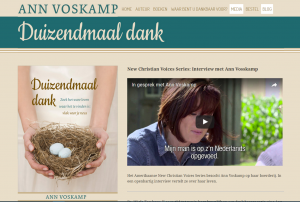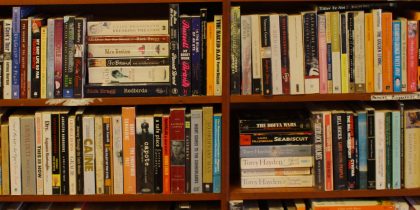In recent weeks, Ann Voskamp, author of the widely read book "A thousand thanks" [1]visit me several times. Figuratively speaking then. That is why we pay attention to it in this post. We discuss the teaching and practice it propagates because, in fact, it is nothing more than what we have learned in "the way of the contemplationhave already discovered.
Statues of God in attractive packaging
There are quite a few popular books in the Christian bookshop that aim to let the reader discover something about 'living with God'. Something you didn't know until now. They are attractively written and look good. They are fascinating stories, read easily and are in line with the experience of the present time. But the problem is that this attractive packaging contains 'gods' and practices that are unbiblical. They can be images about God, about (the Lord) Jesus or about the Spirit of God and about Their relationship to man, that is, to you. If this is then supplemented with biblical texts, a world of thought is created that sounds biblical, but is not. Books like this introduce you to an unbiblical world that will change your relationship to the God of the Bible sooner rather than later.
'A thousand thanks' by Voskamp is such a book.

A thousand thanks
The writer is looking for God in her busy life. The book begins with dramatic experiences of loss of loved ones, in which she does not experience that God is love. The question for a loving God in a sinful and broken world is therefore the starting theme. Add to that a hectic life with setbacks, worries and struggles. She is looking for God in everyday life. As the back cover of the book says:
Like most readers, Ann Voskamp longs to live her life well. “How do we find joy,” she wondered, “when we're getting nowhere, worrying about everything all the time, and fighting with all those things that go wrong every day? What does a grateful life actually look like when the days are running together and everything is dark? What does God have to offer us today? '
Voskamp describes her quest and discoveries and of course her goal is that the readers (or perhaps mostly readers) will follow her and make the same discoveries. What Voskamp has discovered is that a Christian must learn to see God in all things in life and to thank Him constantly. Maybe this sounds like an open door or something that makes you say, 'yes, of course, that's how it is'. And so there are quite a few things in the book that you could say yes and amen to. That's what makes judging a book like this so difficult, because truth is mixed with untruth. She bases her experiences on biblical texts that are indeed very important for a Christian, but the interpretation she gives is un-Biblical.
That is why we divide our comment into two parts. In this first report we limit ourselves to the main points of the objections.
In the next message (dv in January) we will test the gospel that Voskamp believes against the biblical Gospel. The reason is that it is heartbreaking to read how a young woman has legitimate questions about life and about God, but ends up going astray, without meeting anyone to explain the biblical Gospel to her. That is why we will compare the biblical Gospel and 'the other gospel' on the basis of Voskamp's book.
Voskamp has valid questions about God and life. She lives in a serious Christian community, where she doesn't find the answers. So she goes in search and ends up in a wrong way. It's heartbreaking.
The main misconceptions
Several things are written in the book that are unbiblical, but the most important is the following.
- In the first place, it is assumed that you can discover God in all things. God is in all things, so you can meet Him in all things and He speaks to you. You just have to come to discover – through practice – that this is so. Then you will experience rest and peace, then your life will become lighter. The Greek word 'eucharisteo’ (thanksgiving) becomes a mantra and common thread through her life.
- On this path of 'thanksgiving' she experiences the love of God for which she seeks. The relationship between her and God is one of love. But this is described in a sensual, erotic way, as a relationship between man and woman. Voskamp also refers to the relationship between Adam and Eve. It is a love relationship in which the physical experience is especially important.
- Finally, this path ends in union with God. This is the end and purpose of 'the contemplation'.
The way of contemplation
Towards the end of the book she goes to Paris and there she experiences union with God. She also describes there that she has now found the same path that Christians have been following for centuries. She herself describes this way, when she says (p. 214 – 216):
“(…) I think of those believers from long ago who had their way of finding the full life, a way to God; a historical example of intimacy with God. (…) But they thought there were only three steps to become filled with God: purification, enlightenment, unification. (…)
Purification was the first step to a full life in God, according to those ancients. In full awareness of the chasm that separates us from God, we pray for God's help to purify the soul of self-will. Likewise with me: eucharisteo has slowly stopped me, opened my hands to clear me of my hold and control of the world. With every gift I accepted and gave thanks for, I gave up something of my own will and accepted His. But my purification, that detachment from sin and self, was not an act of will or effort, but an act of Christ and His grace sufficient for me. Overwhelming grace it was that drew me to the Christ full of glory so that my own self might become empty. Emptying myself to be filled. Full of grace…. To live fully.
Enlightenment, the middle step on the path to full life in God, according to the ancients. The seeker sees. What the ancient saints called a vision of heaven, a way of seeing that brings us closer to God. That's exactly what eucharisteo for me: my eyes that opened to a new direction, to the realization that faith is essentially a way of the eyes. The thousand gifts opened my eyes to the presence of God – more so eucharisteo living, living in gratitude, performed an even greater task: to keep me awake before God. I began to see that nothing I am is worth anything, but that my worth in Him is worth everything—eyes that see set the glory of Christ in full light. I am all eye and see through life like glass to God.
Unification, the medieval Christians believed, was the last and top step in the hungry pursuit of the full life: the mystical unification reached only the most pious of souls. Unit. But don't all true believers, the fiery seers, experience that oneness from the moment of repenting of their guilt, because they have become one with Christ in His death, His burial, and His resurrection from the dead? In fact, unification is always the first step in the Christian journey. And yet, the sense of grace upon grace leads us into an even deeper union, which we feel on our skin, in our veins, in the very depths of our being, an ever fuller sense of communion with Christ. (…)
Indeed, this is the same road that we already described as the way of the contemplation and which is as old as mankind. No wonder she refers to Henri Nouwen and Brother Laurentius just to name a few.
It is a way of concentration and focus on the inner self, resulting in harmony and peace and ultimately bringing about a state that is experienced as 'oneness with God'. It is a way of practice that leads to a heightened consciousness, through which man opens himself to the invisible world.
What man experiences in this state are not things of God, but things that come from Satan and his demons.
Mysticism is idolatry
To briefly summarize what has already been described in more detail elsewhere:
- Man without God can (in several ways) manipulate his consciousness into a higher state, whereby he perceives reality differently and opens himself to the invisible world. What he perceives in this state comes from satan and his demons and his 'supernatural' experiences which in many cases are experienced as very positive, healing and soothing. Meditation, yoga, reiki, and (certain types of) music, among others, are ways to raise consciousness to a higher state.
- When a Christian tries to get "contact with God" in a similar way, he will certainly have special experiences, which he thinks is "God." But God mentions this in the bible'idolatry' and makes clear that what he experiences 'communion with demons’ is.
- Important Bible passages include:
- “Beware lest your heart be deceived so that you turn aside and serve other gods and bow down to them.” (Deuteronomy 11:16). What it means to "serve other gods" is a little further down:
- “Beware . . . lest you inquire after their gods, saying, As these nations have served their gods, so will I also do it. You must not do as they do before the Lord your God!” (Deuteronomy 12:4, 30, 31). This shows that they must not approach God in the way that the heathen approach their gods!
- “(…) what the Gentiles sacrifice, they sacrifice to demons and not to God, and I do not want you to have fellowship with the demons” (1 Corinthians 10:20). Christians too will have fellowship with demons if they approach God in a pagan way.
- The clear teaching of the Bible is that a Christian who approaches God in the wrong way (the 'way of the nations') will not experience God, which he thinks, but the experiences will come from demons.
Living in the now
What Voskamp does is the same as what the world does: opening up to the invisible world in order to experience 'happiness'. She just calls it something else: 'a deeper experience of God'. The world in 2017 calls it 'living in the now'; or also 'conscious living', 'living in the moment' or 'living with attention'. For example, if you google 'living in the now' you will immediately get 66.9 million hits! It shows how the Netherlands (and not only there) is working on this subject. If you then look through the beginning of the Google result, it soon becomes apparent that Voskamp's working method and the worldly way of 'living in the now' yield the same results. Furthermore, on various sites it is simply stated that it has to do with Hinduism. Some just call it "mindfulness" or yoga. See a few random quotes below.
Build a small satisfaction habitWhere others see getting their daily groceries as an annoying and time-consuming chore, my aunt chooses to use it as a recovery moment. She uses the trip to make her life better. · in a traffic jam; · waiting for the train, tram, metro, bus or ferry; · put the container outside; · walks to the shops; · is able to cook; · enjoy your children playing on a bench in the playground; sitting on the toilet (Great place for daily contemplation, ….) · is taking a shower; · sweeps the garden; · getting ready to go to bed; · cycle to the yoga school; · etc. |
Enjoy the little momentsLiving in the Now means enjoying the little moments. A nice conversation with a friend, the first rays of the sun in spring, a beautiful flower in the park, it doesn't have to be big things. Living in the now makes you more aware of the little happiness that is in your life. (source: https://innerlijkefocus.nl/leven-in-het-moment-oefening-en-tips-om-meer-te-genieten-van-het-nu/) |
Read . . . and now?
When I was young I also read the booklet “Awareness of God's Presence” by Brother Laurentius and some books by Henri Nouwen or Augustine. Sometimes you couldn't pick up things because you felt they were too vague. Then you left that alone. On the other hand, there was also something of 'what they experience is very special, I would really like that too'. Only, how to realize that, that remained a mystery to me. Good thing, too.
You may have read the “A Thousand Thanks” and no doubt it impressed you. I hope this message has convinced you that it is a wrong way for a believer, that leads away from the Lord Jesus Christ and eventually makes you lose faith. The Bible calls it idolatry and utterly rejects it!
[1] Also see http://www.verhoevenmarc.be/PDF/AnnVoskamp.pdf and a more extensive review in http://cicministry.org/commentary/issue120.htm (English)


